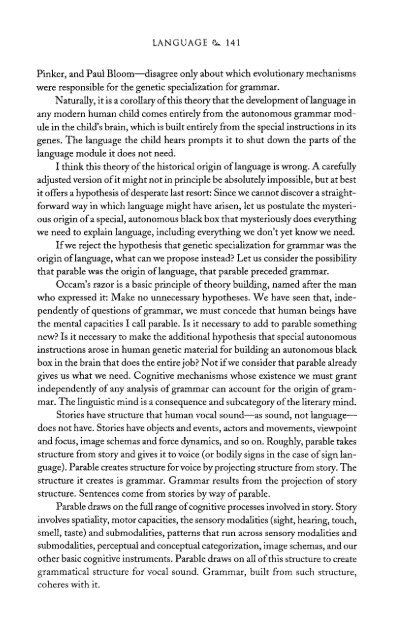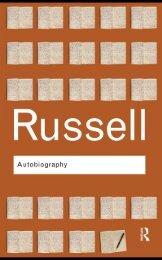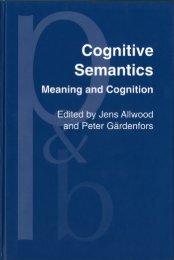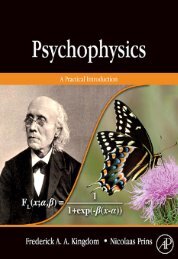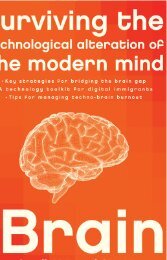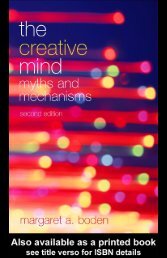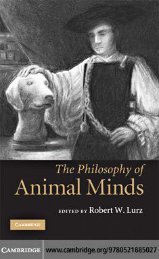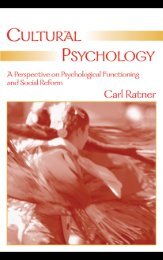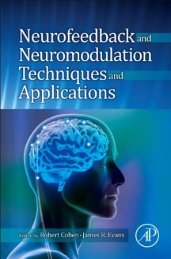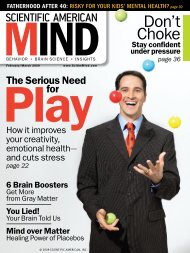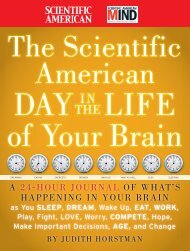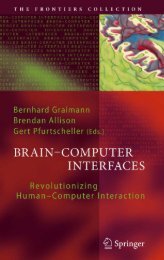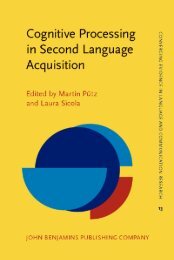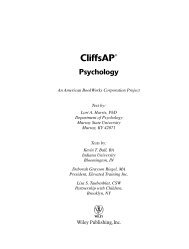The Literary Mind.pdf
The Literary Mind.pdf
The Literary Mind.pdf
You also want an ePaper? Increase the reach of your titles
YUMPU automatically turns print PDFs into web optimized ePapers that Google loves.
LANGUAGE 141<br />
Pinker, and Paul Bloom—disagree only about which evolutionary mechanisms<br />
were responsible for the genetic specialization for grammar.<br />
Naturally, it is a corollary of this theory that the development of language in<br />
any modern human child comes entirely from the autonomous grammar module<br />
in the child's brain, which is built entirely from the special instructions in its<br />
genes. <strong>The</strong> language the child hears prompts it to shut down the parts of the<br />
language module it does not need.<br />
I think this theory of the historical origin of language is wrong. A carefully<br />
adjusted version of it might not in principle be absolutely impossible, but at best<br />
it offers a hypothesis of desperate last resort: Since we cannot discover a straightforward<br />
way in which language might have arisen, let us postulate the mysterious<br />
origin of a special, autonomous black box that mysteriously does everything<br />
we need to explain language, including everything we don't yet know we need.<br />
If we reject the hypothesis that genetic specialization for grammar was the<br />
origin of language, what can we propose instead? Let us consider the possibility<br />
that parable was the origin of language, that parable preceded grammar.<br />
Occam's razor is a basic principle of theory building, named after the man<br />
who expressed it: Make no unnecessary hypotheses. We have seen that, independently<br />
of questions of grammar, we must concede that human beings have<br />
the mental capacities I call parable. Is it necessary to add to parable something<br />
new? Is it necessary to make the additional hypothesis that special autonomous<br />
instructions arose in human genetic material for building an autonomous black<br />
box in the brain that does the entire job? Not if we consider that parable already<br />
gives us what we need. Cognitive mechanisms whose existence we must grant<br />
independently of any analysis of grammar can account for the origin of grammar.<br />
<strong>The</strong> linguistic mind is a consequence and subcategory of the literary mind.<br />
Stories have structure that human vocal sound—as sound, not language—<br />
does not have. Stories have objects and events, actors and movements, viewpoint<br />
and focus, image schemas and force dynamics, and so on. Roughly, parable takes<br />
structure from story and gives it to voice (or bodily signs in the case of sign language).<br />
Parable creates structure for voice by projecting structure from story. <strong>The</strong><br />
structure it creates is grammar. Grammar results from the projection of story<br />
structure. Sentences come from stories byway of parable.<br />
Parable draws on the full range of cognitive processes involved in story. Story<br />
involves spatiality, motor capacities, the sensory modalities (sight, hearing, touch,<br />
smell, taste) and submodalities, patterns that run across sensory modalities and<br />
submodalities, perceptual and conceptual categorization, image schemas, and our<br />
other basic cognitive instruments. Parable draws on all of this structure to create<br />
grammatical structure for vocal sound. Grammar, built from such structure,<br />
coheres with it.


